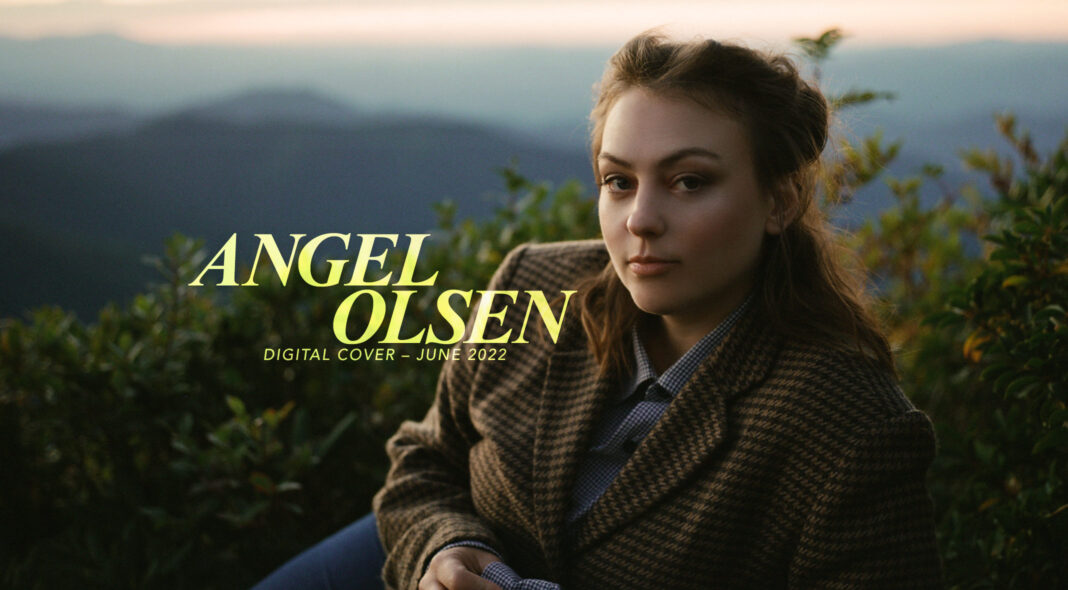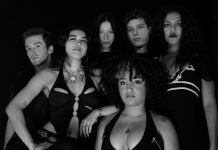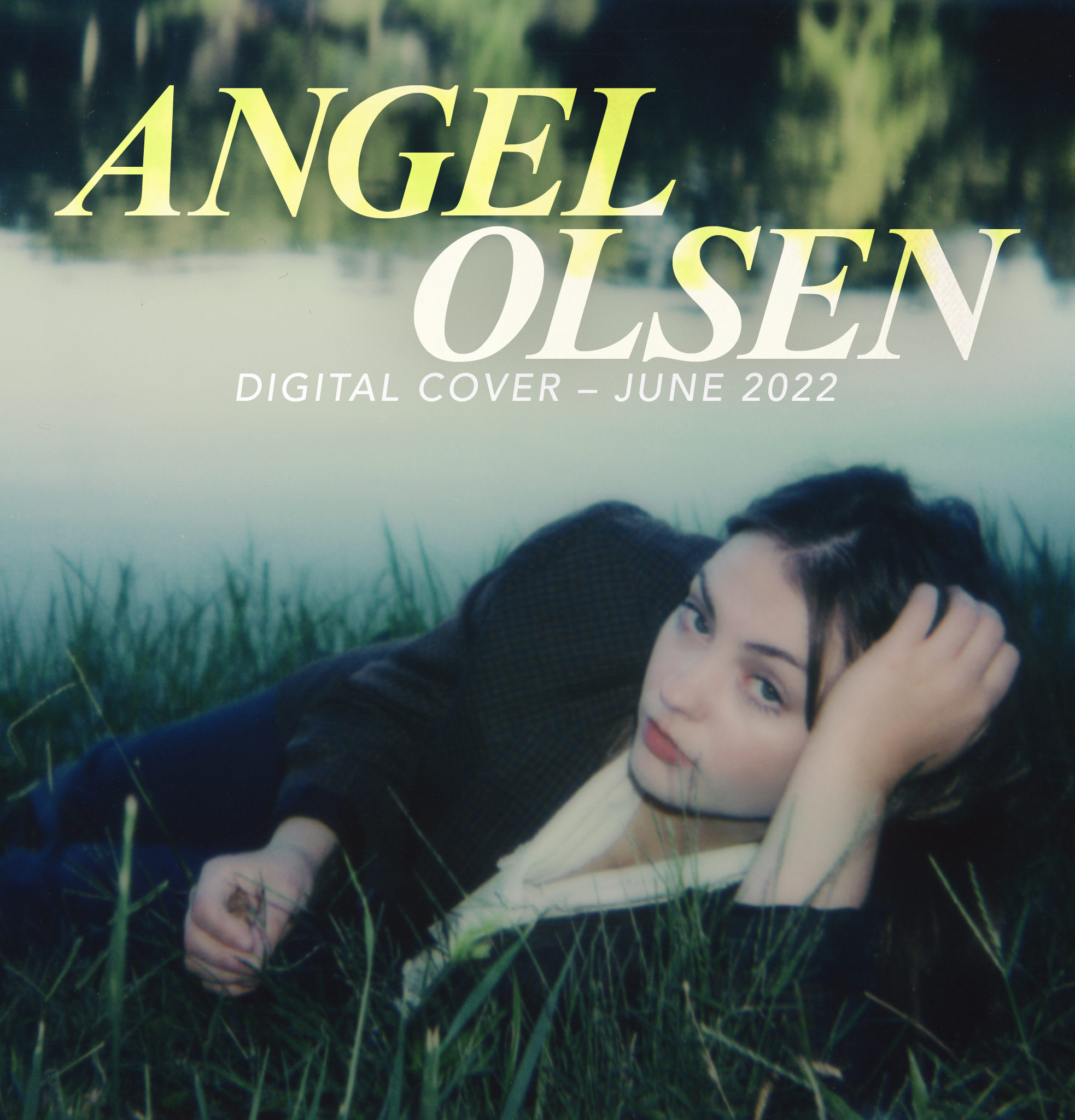
Angel Olsen: Through The Looking Glass
On new album, ‘Big Time’, Angel Olsen translates both the weight of immeasurable grief and a new understanding of herself into heartfelt Americana. She tells El Hunt about a truly transformative period.
If you’ve ever been pulled with force into the pitch-black, swirling vortex of grief, maybe you’ve also felt the sensation of time seeming to warp and tear around you, or the sheer instability of feeling like a single moment of loss has permanently changed the shape of you, forever. Attempting to carefully return to yourself again while carrying bereavement along for the ride can feel like being transplanted back into the world after visiting a secret, other place – a sensation which Angel Olsen compares to bursting back out of a looking glass or rabbit hole.
“The whole Alice in Wonderland thing… it’s really like that,” she says, nursing a can of Stella and perched on a sofa in east London, a day before playing stripped-back songs from ‘Big Time’ live for a hushed audience. It’s only the second time she’s performed them live. “I love the idea of time being big – because it really is, lately – and also how big time it feels when you lose people, and how much you can change in a day forever. It’s almost like you went to some other place and then came back.” And these are the kinds of ideas that ground the Asheville musician’s new album ‘Big Time’ – a warm, soft-edged record of not-quite-country that draws on Americana, sweeping Disney strings, and the timeless, closely confiding music of artists like Carole King and Dusty Springfield, and charts a slow, careful return to reality after disappearing into the void.
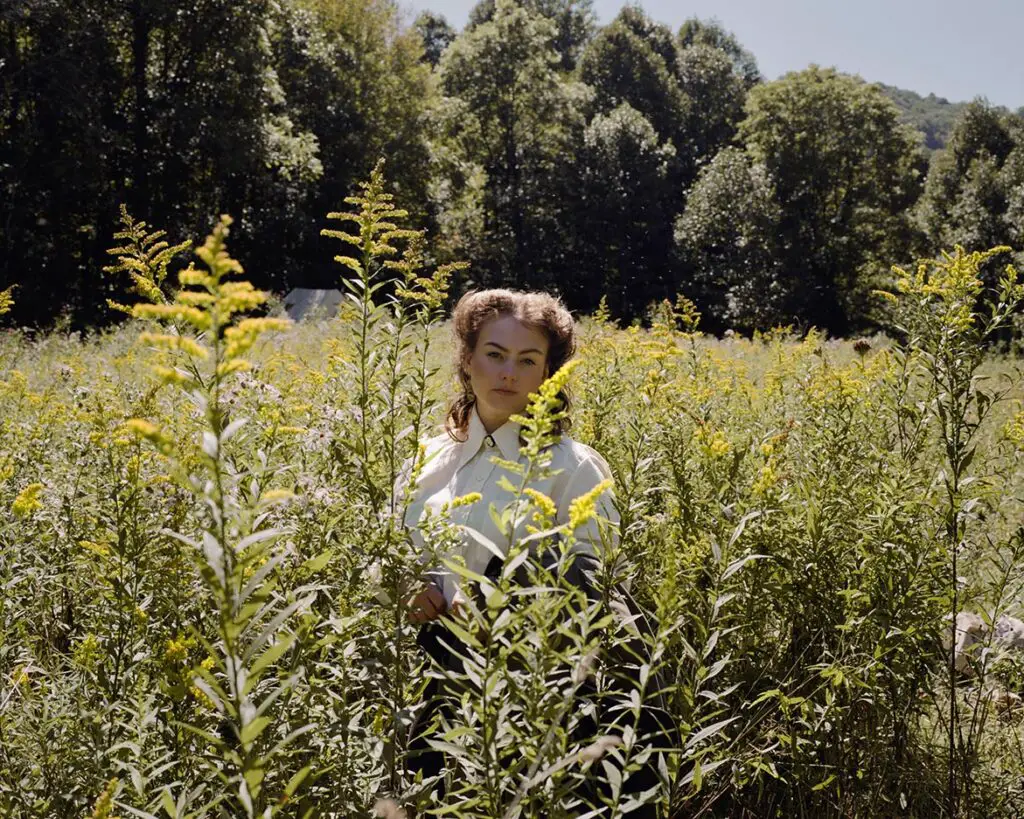
The last year has also been a perspective-altering and difficult time for Olsen, who came out to her parents and introduced them to her partner, Beau Thibodeaux, just a few days before the death of her father. Just weeks later, her mother was admitted to a hospice, where she gathered her nurses around the TV set to watch Olsen perform ‘Like I Used To’ with collaborator Sharon Van Etten on late-night US television. Shortly before she passed away, she asked her daughter to sing for her. “I couldn’t bear… I couldn’t sing one of my songs, so I ended up singing ‘You Are My Sunshine’ [by Jimmie Davis and Charles Mitchell],” Olsen says. “We sang it together and cried, and it was so silly, you know? You think you can speak publicly about your art and what it means, and talk to people about it all the time, and share it and sing it, but when your mother asks you to sing a song, you pick ‘You Are My Sunshine’. You never know what you’re going to do in moments like that,” she shrugs. “It’s often something ridiculous, at the time.”
At her mother’s funeral, suddenly coming out to her extended family and hometown acquaintances at an event so rooted in loss “felt like a movie or something,” she says. “Like, of course you come out and then everyone meets your partner immediately because there’s a death in the family.” Black comedy-esque? She nods. “The uncle was like, ‘I have a friend at work that’s gay!’. Y’know?”
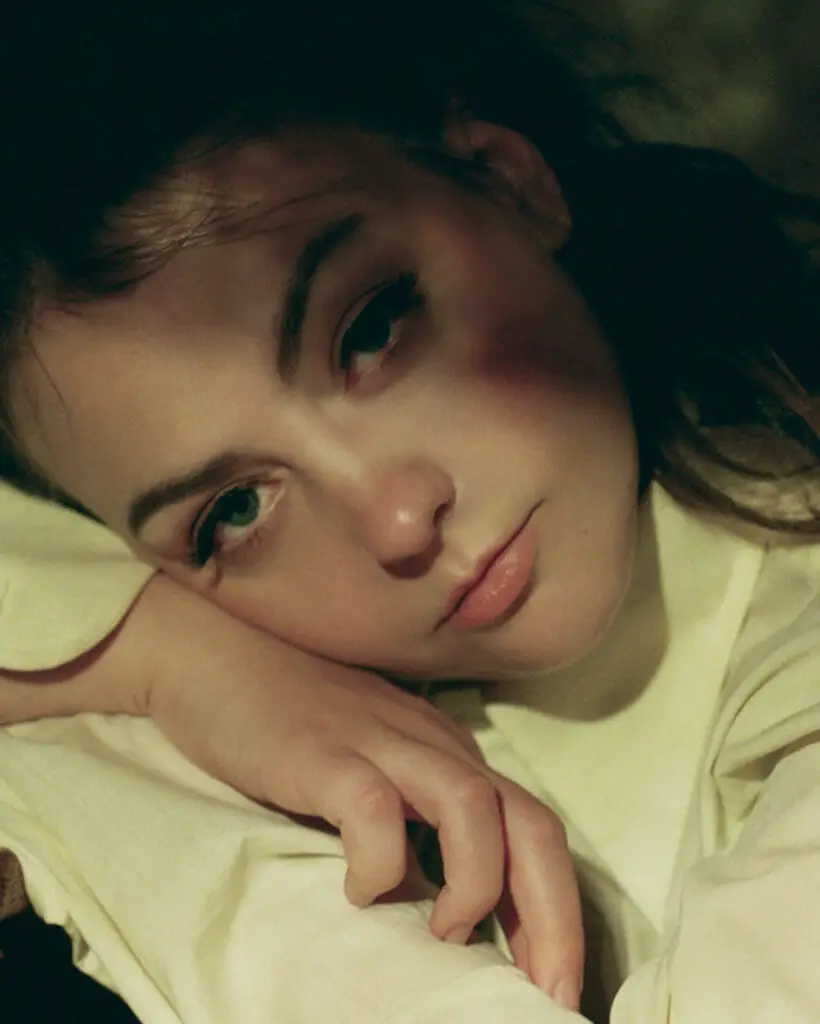
Since moving to Chicago at the beginning of her career, Olsen remembers occasionally wondering if she might be queer, but always brushed the thought to one side. “I had one-off experiences with AFAB [assigned as female at birth] people, my whole life. Whenever I would have frustrated relationships with hetero partners where it would end, I would be suddenly really attracted to somebody that had been my friend. I’d hook up with them and then we’d make breakfast the next day and never talk about it,” she says, laughing. “I’d be like, oh it’s just fun,” Olsen says, feigning breeziness. “I’d play it off as… oh I’m just a sexual person, I’m just interested and curious and I wanna have fun. I’d belittle it and minimise it to mean that it was just nothing.” Years later, Olsen fell in love and got into her first queer relationship with a fellow musician at the beginning of the pandemic – “we were on tour together, and you can research that if you want,” she sidenotes with a smirk, “keeping you guessing, you know?” – and they moved in together in Asheville during the early lockdowns. When the relationship fell to pieces it was crushing, with an intensity she had never felt in the past. “There’s nothing like going through your first queer break-up!” she says. “You’re like: this is how it really feels to have your heart broken, fuck! It really sucks, on a different level.”
There’s nothing like going through your first queer break-up. You’re like: ‘this is how it really feels to have your heart broken. Fuck!’ It really sucks, on a different level.
Angel Olsen
As she was healing, Olsen heard word of a generous neighbour who was inviting bored locals to canoe on his private lake. Over time she became closer with her older neighbour, David, who had recently lost his wife. “He was a special person, an activist, and had a huge anti-Trump magnet on his car… he was obsessed with race cars. He went sky-diving at 81. Just a total character.” When Olsen’s parents died, she found they were able to have the kinds of far-reaching conversations she found that frivolous, everyday small talk steered around at all costs. “I thought: I need to find my people again. I don’t want to be at this bar talking about orange wine all day, and who’s fucking who. I simply don’t give a fuck! A lot of my friends are older, and I’ve leaned into those friendships.”
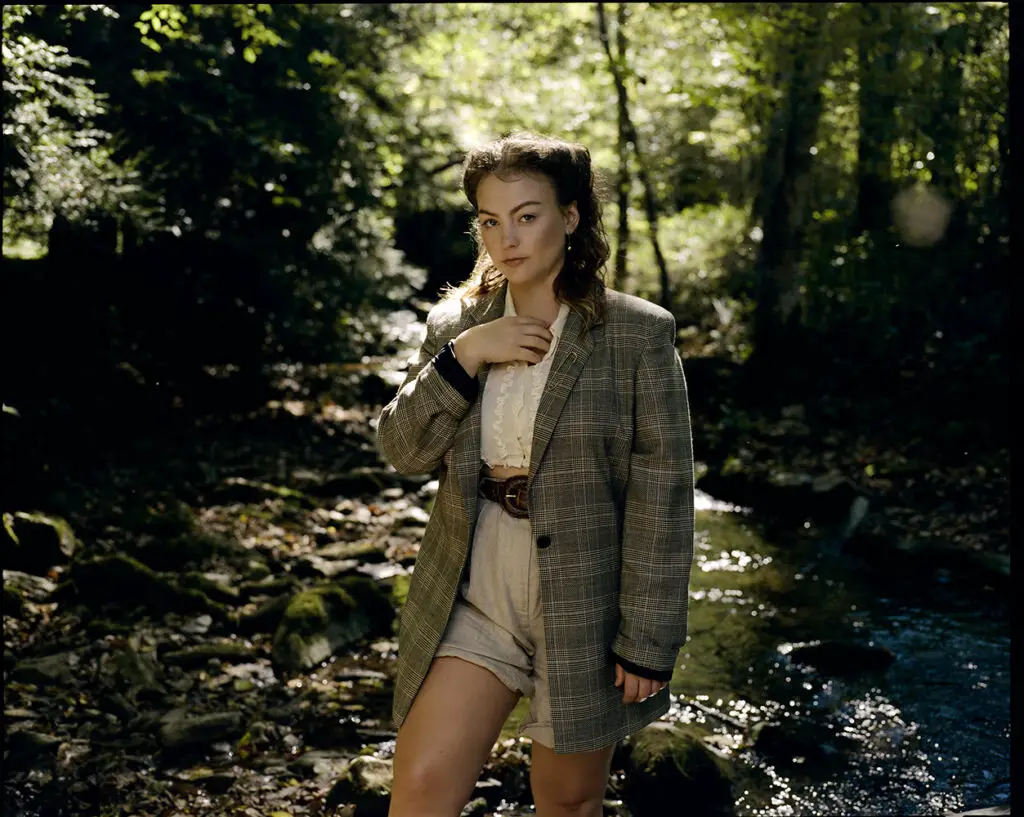
“It was really inspiring to be around someone like him with everything that had happened, and then my parents passed away,” she continues. “I was talking with him about that, and he was like: ‘they’ve lived a really good life, they were ready to go’. I’ve never had that kind of conversation with someone before. It does make me wonder, why do I attract these people to my life, and is it because of my parents?” (Olsen’s parents were retired when they adopted her as a three-year-old). “I think it’s been hard for me to relate to people in the same way unless they’ve dealt with [loss].”
Olsen recently bought a vintage truck, and had been excited to show it to David, but while running errands between Asheville and St Louis – where she originally grew up – she learned that he had passed away. “ I remember crying and calling my friend like: ‘I never got to show him the [‘63 Ford] Ranchero!’ I know it would’ve made him smile.” I tell Olsen I’m sorry to hear about her friend. “It just keeps going, right?” she says. That’s why you’ve gotta go to the dance party sometimes.”
And though ‘Big Time’ is a record partly couched in loss – ’Right Now’ and ‘Ghost On’ were both written during her first queer relationship, while the spare bluegrass-esque ‘This Is How It Works’ is written about her mother – there is also a kind of warmth at its centre, or at least the hope that life will one day continue to rumble on regardless. “I’m so tired of telling you it’s a hard time again,” she sings on the latter, “tell me something good, pull me out from what I’m in”. Co-written with Olsen’s partner in a period of creative stasis, the title-track is a gentle country love song that twangs and sways, honing in on the small moments of joy. “Good morning kisses, giving you all mine,” she sings, “pull back the curtains, show me the sunshine.” Held up next to the rest of Olsen’s discography, which often dissects the thorny tangle of life with an eviscerating precision, ‘Big Time’ has a direct simplicity to it, much like the music that Olsen turned to in her most intense moments of grief. By the time the spare piano of closer ‘Chasing The Sun’ – perhaps the nearest thing Olsen has written to a classic love ballad – spirals up in final, hopeful hum of cinematic strings, it sounds like slowly emerging back into the light again, back out of the rabbit hole and into the blinding sun.
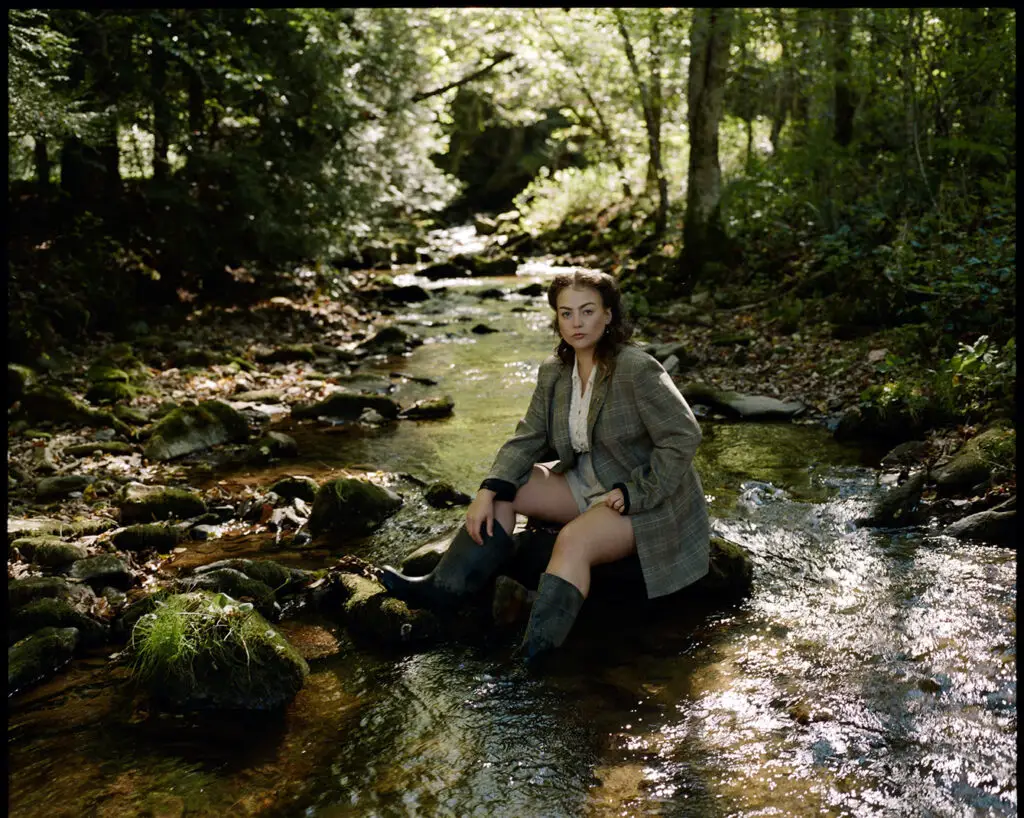
‘Big Time’ is also accompanied by a surreal short film, made in collaboration with director Kimberly Stuckwisch. Based on an especially vivid dream Olsen had in the earliest stages of bereavement, the visual incorporates a voicemail left by her mum. “Call me when you can,” she says as Olsen cradles the handset and sobs. “I know you’re real busy.” “I think it’s really cool to be able to share her voice with the world,” she says now, of that particular scene, “and be like: this is the person who inspired me most in my life, and she’s gone.” Other plots have been inserted to further heighten the spectre of loss; Olsen’s arguments with her partner about coming out to her family and friends are fictionalised, and after Thibodeaux (who co-stars in the film) falls into a deep, dark void, Olsen begins time travelling through a fantasy world of eerie bars and brightly-lit picnics; a kind of holding bay for people who are deep in the hold of loss and can’t face returning to real life again. “Stay a while,” an older woman urges repeatedly, happily frozen in a between-place where the past stays buried, and thoughts of the future are avoided at all costs. Olsen meanwhile is conflicted, with flickers of reality pulling her back to the turf-lined elevator she arrived in. “I lost sight, then I made up my mind,” Olsen sings on ‘Through The Fires’, stepping away from this idyllic but impossible place, “to learn to release the dreams that had died.”
Olsen admits to feeling nervous about her film screening the following day – appropriately, held in Angel. “It’s going to be funny, watching myself,” she says. “It’s always weird to watch yourself in front of people but I was definitely still processing a lot when I filmed it, and now I’m processing, but I feel back in my body: I’m taking care of myself more, exercising more, not drinking all the time. Part of me keeps thinking: I look better now. So that’s hard, but I think… I keep being like, well, if Charlize Theron can making fucking, Monster, I can sit through this and just see through what I feel about myself, get through the insecurities, whatever they are. I do think that it feels a bit like The Truman Show when I make a record,” she adds, referencing the cult ‘98 satire film about a man who unwittingly lives his entire life inside a carefully constructed reality TV show, his emotions meticulously filmed for public consumption. “Not even with this one, but with the previous ones as well. It feels weird, art imitating life, and life imitating art. I’m so thankful that I have art for the life stuff, but I’m also so thankful that I can go home to a place that has nothing to do with any of the shit.”
it feels a bit like The Truman Show when I make a record.
Angel Olsen
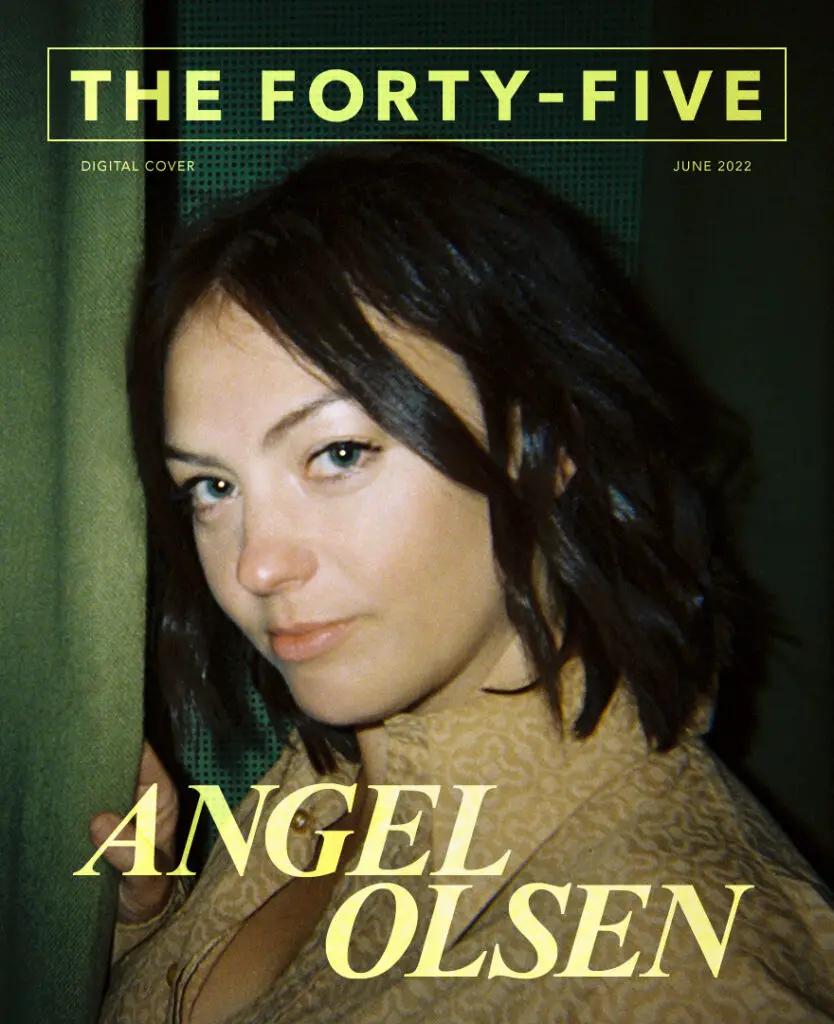
And speaking of home, Olsen is looking forward to heading out on the road across the US with New Jersey singer-songwriter Sharon Van Etten and Memphis indie artist Julien Baker later this year on their joint Wild Hearts tour; she’s especially relishing the chance to share the spotlight with two other lead singers who understand the Truman Show-esque sensation she sometimes feels. “Sharon Van Etten is somebody who I know for a fact has to make music,” she says. “It’s not just to be interesting or beautiful or cool, her heart is in it. Her life has had ups and downs and it’s made its way through her music and you can feel that. It’s so nice to have a sister in that. She’s so unashamedly vulnerable and it’s hard to find that in a community. I’m really looking forward to sharing a stage with her after all of this stuff has happened.’’
Beyond that, meanwhile, Olsen is excited to return to Asheville, where the winding roads of the nearby mountains are waiting, along with her gigantic cat Violet. Last time I spoke with Olsen, she joked that the feline in question helped her to write ‘All Mirrors’ – this time, she insists that Violet has inadvertently helped her to rediscover her joie de vivre. “She’s diabetic, but she’s doing well, she’s spry, the meds are really working,” she says.” I love her to death. She really is a different kind of beast. She’s very bossy, she talks a lot and she’s food obsessed, so we have a lot in common.”
“She told me what to leave out of the record,” she laughs. “She was like, take risks, you only live once.” Olsen briefly pauses for thought. “But for her she lives nine times, so it’s easier.”
‘Big Time’ is out now.
Like what we do? Support The Forty-Five’s original editorial with a monthly Patreon subscription. It gets you early access to our Cover Story and lots of other goodies – and crucially, helps fund our writers and photographers.


